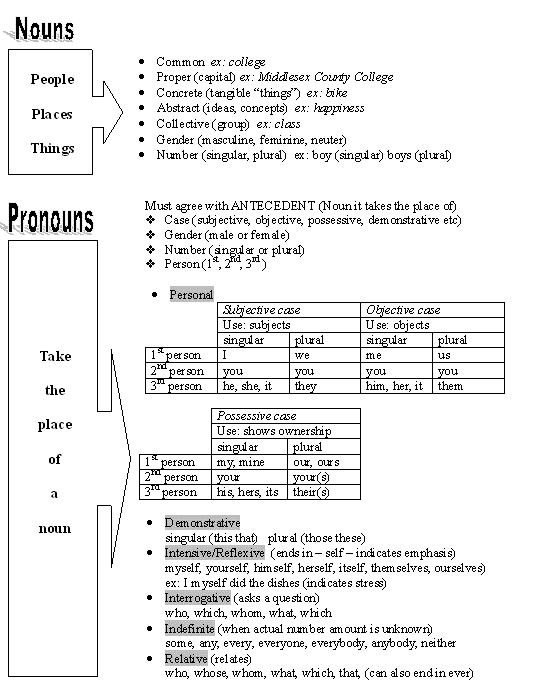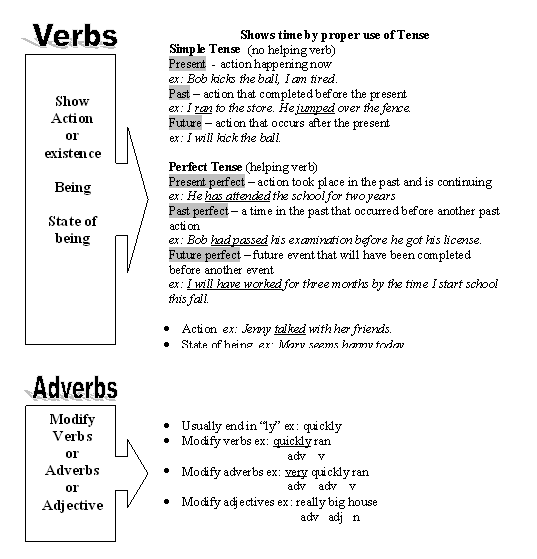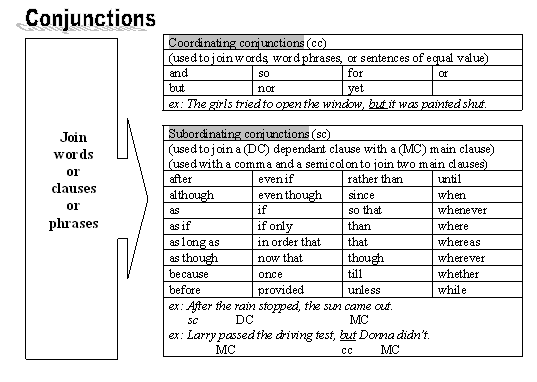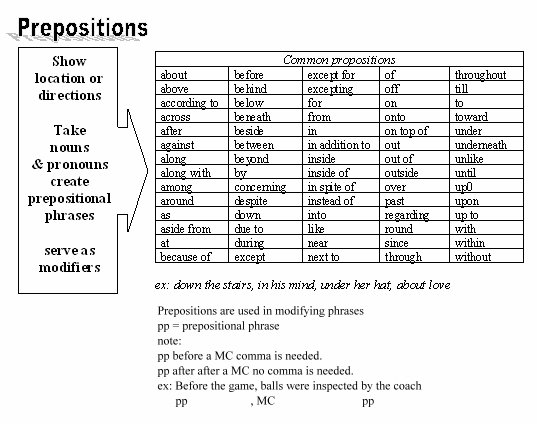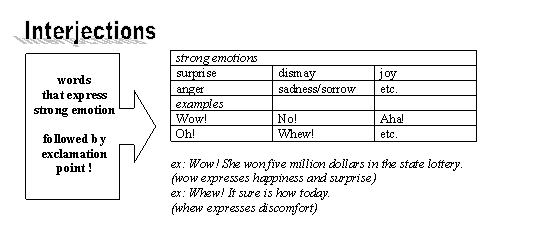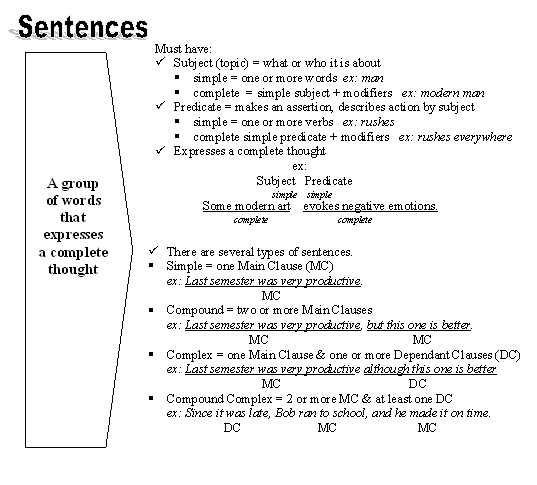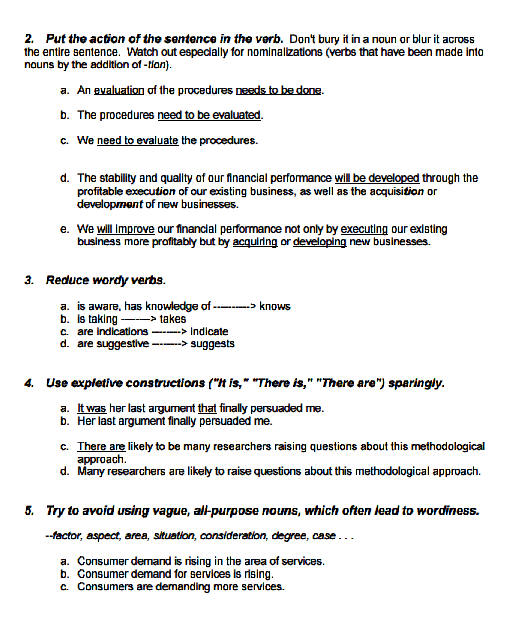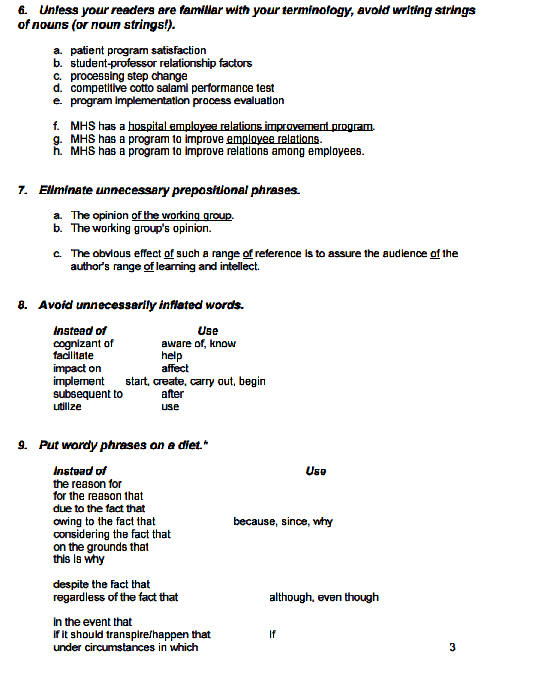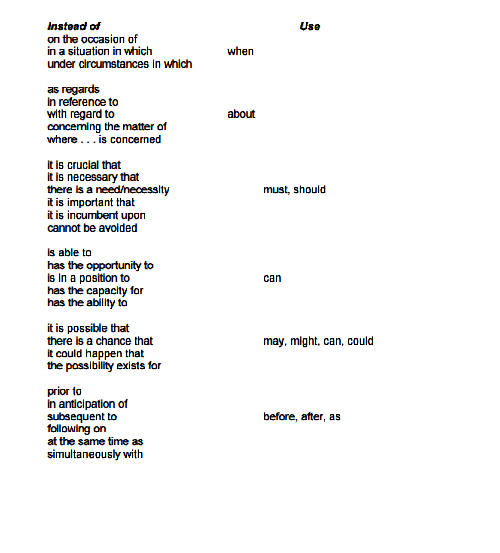|
Good writers adhere to
good usage of grammar and accurate sentences not merely to abide by
a bunch of rules, but because to do otherwise is not effective.
Grammatically inaccurate sentences confuse readers and detract from
writer credibility. Regardless of how well you write,
if there are too many sentence errors your writing will suffer
greatly!
Guide to understanding
codes, sentence mechanics, making
corrections, and enhancing writing
|
||||||||||||||||||||||||||||
| codes | explanations - examples - corrections | |||||||||||||||||||||||||||
|
A adj\adv error |
Adjective
(adj) ex: I ran a difficult race adj noun Adverb (adv) (generally end in "ly" ex: I ran well yesterday. V adv ex: I ran extremely well yesterday V adv adv ex: It was a terribly difficult race. adv adj noun |
|||||||||||||||||||||||||||
|
AB abstract |
Abstract (click link for info) | |||||||||||||||||||||||||||
|
AD don't advertise |
Don't explain what you are going to do; just do it
example 2 of AD
example 3 of AD |
|||||||||||||||||||||||||||
|
Anonymous nameless assignment |
Any assignment without a
code# or incorrect code# will be noted as Anonymous # (the
student writer is unknown) To correct this problem & possibly get a grade Via Canvas email Notify me (Prof. B) of this problem with the following information. Code# & Section Assignment Anonymous # . example: F000 - IN1 Shorter Writing 1 Anonymous 1 |
|||||||||||||||||||||||||||
|
APOV author's point of view |
ex: Writing an essay is easy if all the techniques are understood and applied to it.. topic APOV Succumbing to peer pressure in high school can have long lasting effect that extend well into adulthood. topic APOV After being elected to the highest office in the U.S, President Reagan learned to be a great leader. APOV topic APOV note: MI = topic + APOV of a paragraph Thesis = topic + APOV of an entire essay. |
|||||||||||||||||||||||||||
|
Art article error |
Article is
missing or incorrectly used Articles are generally used to introduce nouns. There are 2 basic article. ex: A cat is a good pet ex: When I went to the school next to the candy store, I got lost |
|||||||||||||||||||||||||||
|
AV active voice |
You could probably
use more active voice. Active voice = does action = usually the more direct and effective way to write ex: The committee voted on the bill. Passive voice = receives action = usually less effective and direct ex: The bill was voted on by the committee. |
|||||||||||||||||||||||||||
|
Awk awkward |
This sentence or group of words is awkwardly constructed. It may have numerous errors that overlap or simply not have any meaning. There is probably a much better way to say it | |||||||||||||||||||||||||||
|
BS Brainstorm |
This is a general term that refers to the activity of
exploring a topic before writing about it.
Before writing it is advised to gather much information
about a topic. Think on paper. Do not limit thoughts, and jot down
anything that will stimulate more thought. Without doing this
activity, a writer is basically writing without any knowledge of a
topic. There are several ways to do this. explore - write for a specified amount of time - gather all you can - think of what makes your topic unique ex: written phrases, words, sentences, symbols, pictures, anything that will help you learn about your topic put pen to paper (or fingers to keyboard) and simply write ex: paragraph form group items that are in your brainstorm and then brainstorm on each one - this is very helpful when writing an essay that requires several MI to support a Thesis. ex: Let's say you are writing about someone you admire - your mother. Do a short preliminary brainstorm of what you know about her. Think of larger areas that make her who she is. Perhaps all you briefly wrote down seems to fall into 3 categories: Personality, Determination, & Attitude. Now do 3 separate BS on each: one BS for personality - one BS for determination - one BS for attitude. Each will contribute towards comprise a MI in your essay. Now you have 3 MI already for your essay. All together they will help you create a Thesis. |
|||||||||||||||||||||||||||
|
Cap capital error |
ex: Bob is a good dancer. ex: Tom, Middlesex County College, Virginia ex:I went to the store |
|||||||||||||||||||||||||||
|
CC coordinating conjunction error |
Coordinating Conjunctions
(CC)
are those little words that are commonly
used to join thoughts within a sentence: and, but, so, for, nor, yet. ex: John went to the store and bough apples, pears, and bananas. (note comma usage) To begin a sentence with a CC is basically using them to join the sentence it begins with to the sentence that came before it. This is not their purpose. ex of incorrect usage. My father is a tough man. And he is a good provider for our family. Correction My father is a tough man, and he is a good provider for our family. MC , cc MC |
|||||||||||||||||||||||||||
|
Clauses
|
|
|||||||||||||||||||||||||||
| Coherence | Coherence (click link for info) | |||||||||||||||||||||||||||
|
Com comma error |
There are basically 10 situations in which a comma is used. If
you are going to insert a comma, know why you are using it. This
list indicates correct comma usage. MC, cc MC ex: Bob ran, but Jane walked to the store. (note: the comma must precede the cc (but)) MC , cc MC DC, MC ex: Because I was late, I was not allowed to take the test. DC , MC * no comma is needed when the MC comes before the DC. ex: I was not allowed to take the test because I was late. MC DC ex: It was a small, dingy, and cold room (note comma goes before and) ex: John, go to the store. MC ex: First, clean the car thoroughly. ex: Frank, the guy in the back row, constantly disrupts the class nonessential phrase * no comma is necessary for essential phrases (those that are needed to complete the meaning) ex: Any student who doesn't do the work will fail. (no comma with necessary phrases) essential phrase ex: to do well on a test, you must study diligently. infinitive ex: Mary said, "Seth is a good guy." ex: Mary lives at 427, Vette Avenue, Perth Amboy, New Jersey 07002 ex: Soon after, * no comma is needed if the MC comma first. ex: She left for the conference soon after |
|||||||||||||||||||||||||||
|
Con conclusion |
Ending an essay memorably Conclusions (click link for info) |
|||||||||||||||||||||||||||
|
CS concluding sentence |
This is a sentence that
wraps up a paragraph and often can be used as a transition to the next
paragraph. Do not leave reader's hanging. Make a good end to every
paragraph. Unity (click link for info) |
|||||||||||||||||||||||||||
|
CSP comma spiced sentence error |
CSP
= Two MC in the same sentence separated by a comma
(basically the same error
as a
Run-on) Before learning RO, see: clauses. , Comma, cc, Parts of Speech for cc & sc. ex of CSP : John loves Stephanie, he thinks she is a wonderful woman. MC , MC. Corrections using proper punctuation and\or coordination with 2 or more MC in one sentence.. You can use as many MC in a sentence as you want as long as you punctuate and\or coordinate them correctly. John loves Stephanie , but she doesn't love him. MC , cc MC. DC , MC. MC DC. MC ; MC. MC ; sc , MC. |
|||||||||||||||||||||||||||
|
Dev development |
Development Concrete support for Main Ideas (MI) Development (click link for info) |
|||||||||||||||||||||||||||
|
DM
|
A group of words that is intended to
modify something but doesn't. ex: Running around all day, Jake's feet were tired. DM (note: whatever follows the modifier is the object of it - Jake's feet were not Running around all day.) correction: Add something being modified Running around all day, Jake soaked his tired feet (Jake is now running around all day) |
|||||||||||||||||||||||||||
|
Ego egotism |
You are focusing more on yourself than the topic. Focus on your topic. | |||||||||||||||||||||||||||
|
Ex examples |
Examples are an excellent way to support a MI. They provide concrete proof. | |||||||||||||||||||||||||||
|
FD follow direction |
You
are not doing what has been asked. Points will be deducted. Read the instruction carefully. For the best results, do what is asked. |
|||||||||||||||||||||||||||
|
Fg sentence fragment |
A complete sentence has a Subject
(whatever is being written about) & Predicate (what the subject is
doing or the circumstances around it). A fragments is missing a
subject or predicate or both. example of FG The big car which was racing down the street and swerving at a fast pace subject only (needs predicate - what did it do?) correction The big car which was racing down the street and swerving at a fast pace almost hit the big oak tree. subject predicate |
|||||||||||||||||||||||||||
|
FL figurative language |
Stylish writing to maintain reader interest and make writing vivid. Figurative Language (click link for more info) |
|||||||||||||||||||||||||||
|
FOAS focus on accurate sentences |
This writing exhibits
too many sentence errors that hinder a better grade. All Codes abbreviations are explained on this CODE SHEET with examples and corrections. The most common errors are: COM = Comma error (missing or not needed) CSP = Comma Spliced Sentence DM = Dangling Modifier FG = Fragment mpm = Misplaced Modifier PRO = pronoun error RO = Run -on Sentence SS = Sentence Sense S-V = Subject + Verb do not agree VS = verb shift VT= verb tense W = wordiness |
|||||||||||||||||||||||||||
|
GMOOYW get me out of your writing |
Too much second
person (use of the word YOU) You = the reader. Do not write about the reader. Essays using 2nd person when the assignment requires 3rd person writing will have points deducted.. Don't do it. You (click link for info) person |
|||||||||||||||||||||||||||
| GR |
|
|||||||||||||||||||||||||||
| Grabber |
This is a way of getting readers
interested in reading an essay. Introductions (click link for info) |
|||||||||||||||||||||||||||
|
IND Indent new paragraphs |
When beginning a new paragraph indent several spaces - this indicates to the reader that you are starting to explore a new MI. | |||||||||||||||||||||||||||
|
IF inappropriate familiarity |
It is not appropriate to refer to an author by a first name; use the last name. | |||||||||||||||||||||||||||
|
Intro introduction |
The beginning of an essay must get reader interest and usually
presents the THESIS. Introductions (click link for info) |
|||||||||||||||||||||||||||
|
KIS keep it simple |
You are having
trouble writing accurate sentences because you are addling too much or
write confusing sentences. Focus
on accurate sentences. Have a clear subject and clear predicate. SS (click link for info) |
|||||||||||||||||||||||||||
| Labeling a File |
The file you submitted was not labeled
correctly. Incorrectly labeled files overwrite other files, get
lost, and\or create confusion and extra unnecessary work. Points
have been deducted from this assignment. If you would like your
points restored, follow these directions: * for the very next assignment that required a file submission, label the next assignment file you submit correctly * notify my via email that you have now submitted a correctly labeled file - in this email provide the following information - you name & your class - the file you have now labeled correctly - the incorrectly labeled file for which you would like your points restored. ex: Joe Smith - Incorrectly labeled file for which I would like the deducted points restored: Shorter Writing 1 Correctly labeled file: Shorter Writing 2 If the above directions are followed, your points will be restored. |
|||||||||||||||||||||||||||
|
MB message board |
Assignments indicated
(MB) are to be done on the message board. How to submit message board assignments (click link for more info) |
|||||||||||||||||||||||||||
|
MC main clause |
MC =
Subject + verb = complete thought ex: Robert left school. subject verb clauses (click link for more info) |
|||||||||||||||||||||||||||
|
MI main idea |
A paragraph should have
only one MI, and that one MI should clearly support the Essay (if it
is part of an essay)The ONE controlling idea of a paragraph. Paragraph = a group of sentences that supports ONE MI Main Idea (click link for info) |
|||||||||||||||||||||||||||
|
MPM misplaced modifier error |
A modifier is a word or group of words that enhances the meaning of a noun. If it is in the wrong part of a sentence, it is MISPLACED. It ends up modifying the wrong noun. The word directly following a modifying phrase or word is what is being modified. example
1 MPM
example 3 of MPM |
|||||||||||||||||||||||||||
|
MW missing word |
There is a word missing.
It could be an article or preposition which usually precedes a noun. ex: incorrect: The second story explains the relationship siblings (missing a preposition) correct: The second story explains the relationship between siblings incorrect: My cousin went to library to study. (missing an article) correct: My cousin went to the library |
|||||||||||||||||||||||||||
|
MWH more would help |
What you did was very sparse and not enough to sustain and essay. This usually applies to Brain Storming. It is important to gather a lot of info, ideas, statistics, details, sensory details, cases, & anything that will help you create MIs for your essay. Also Development in the paragraphs should come from the Brainstorm activity. Do more! | |||||||||||||||||||||||||||
|
NonSeq non sequitar does not follow |
Either a sentence is not
making sense because one part does not seem to logically follow a
first part, or a sentence does not sensibly follow a prior
sentences. ex: After the big game we went out for pizza; which made me very sleepy. (going out for pizza did not make your sleepy) correction: After the big game we all went out for pizza. I ate too much, and by the time I got home, I was very sleepy. |
|||||||||||||||||||||||||||
|
NOT not on topic |
This writing assignment does not address the prompt provided. It does not focus on a topic for this assignment. | |||||||||||||||||||||||||||
|
NP new paragraph |
When beginning a NEW PARAGRAPH indent several spaces or skip a line. This indicates to a reader that a new MI is coming. | |||||||||||||||||||||||||||
|
NSR no score recorded |
No score has been put in the grade book probably
for 1 of 3 reasons: 1.The assignment was not correctly labeled - I do not know who wrote it, or I cannot tell what it is I am reading. (The assignment must be labeled as instructed, or I will not know how to grade it or where to put the grade!) 2. A name on the assignment does not appear n my roster. (Your name, the one you registered with, is on my roster, must appear on the top of all work.) 3. The assignment was not done as instructed. (wrong pages read, incorrect writing, etc.....) If there is another reason, it will usually be noted on the assignment The student who did it receives a "0"because no grade has been given. Campus Cruiser automatically converts a "0" to an "F To correct this problem & possibly get a grade Notify me (Prof. B) immediately with the following information. Name, Section, Assignment, NSR# ex: Name: Mary Smith Section: IN1 Assignment: Shorter Writing 1 NSR2 also see:
anonymous |
|||||||||||||||||||||||||||
|
NSW no such word |
The word you are using is not a word
in the English language.
example 3 of NSW |
|||||||||||||||||||||||||||
|
OMI one MI per paragraph |
A paragraph should have
only one MI (Main Idea) The
remainder of the paragraph should support through
development of that ONE MI. A MI (an abstract statement) cannot be supported by another MI (abstract statement). Learn development . |
|||||||||||||||||||||||||||
|
O-O-I order of ideas |
Order of Ideas (click link for info) | |||||||||||||||||||||||||||
|
Pct punctuation error |
Use punctuation
correctly. |
|||||||||||||||||||||||||||
| Person |
The term "Person" determines the
perspective of the writer. There are 3 perspectives a write can
choose from: 1st = about the writer (I, me) 2nd = about the reader (you) 3rd = about everything and everyone else in the entire world (he, she, it) Most college writing should be in 3rd person because that is what students are learning and should be writing about. Students will for the most part not be asked to write about themselves nor the reader. They will be asked to write about course content (3rd person). The 3 "Persons" and how to correct improper "Person" are explained as follows: 1st
Person For more help with inappropriate use
of YOU see: you |
|||||||||||||||||||||||||||
|
PL plural singular error |
The word needs to be plural, or a plural needs to be a singular. When writing about ONE item use the singular. ex: friend (Joe is my friend.) one person ex: friends (Mom gave my friends and me cookies and milk.) several people |
|||||||||||||||||||||||||||
|
POS parts of speech |
|
|||||||||||||||||||||||||||
|
parts of speech |
|
|||||||||||||||||||||||||||
|
Pos possessive error |
Shows ownership
- may have been omitted or used in place of a plural. Plural
possessive = ownership by more than one = apostrophe goes
after the "s" |
|||||||||||||||||||||||||||
|
Pro pronoun error |
Pronouns are words that take the
place of nouns.
Subjective case
= used as subjects of a sentence or a Main Clause (MC) (I, you,
he, she , it, who, we, you, they)
Objective Case
= not subject (me, you, him, her, it, whom, us, you, them) Some common
pronoun errors with corrections
Incorrect:
The team practiced diligently and won
their game.
Incorrect: Someone is
on the phone, and they want to talk to you.
Correct: Someone is on the phone, and
she
wants to talk to you.
Incorrect: It is important to teach
a child manners so that
they will grow up to be polite.
Incorrect: A
parent is important because they instill values and morals in
their children.
Incorrect: Conrad and
her went to the movies.
Incorrect: Kenny and
me went to the movies.
Incorrect: Kenny and went to
the movies with Bob and I
Incorrect: Larry sat next to
Nancy and I at the concert.
|
|||||||||||||||||||||||||||
|
NPS not parallel structure |
Parallel Structure
You have not used parallel structure in
a sentence.
Parallel structure means using the same pattern of words to show that two or more ideas have the same level of importance. This can happen at the word, phrase, or clause level. The usual way to join parallel structures is with the use of coordinating conjunctions such as "and" or "or." Words and PhrasesWith the -ing form (gerund) of words:
Parallel:
Mary likes hiking,
swimming,
and bicycling.
With infinitive phrases:
Parallel:
Mary likes to
hike, to
swim, and to
ride a
bicycle.
OR Mary likes to hike, swim, and ride a bicycle. (Note: You can use "to" before all the verbs in a sentence or only before the first one.) Do not mix forms.Example 1
Not Parallel:
Parallel: Example 2
Not Parallel:
Parallel: Example 3
Not Parallel:
Parallel: ClausesA parallel structure that begins with clauses must keep on with clauses. Changing to another pattern or changing the voice of the verb (from active to passive or vice versa) will break the parallelism. Example 1
Not Parallel:
Parallel:
Parallel: Example 2
Not Parallel:
Parallel: Lists After a ColonBe sure to keep all the elements in a list in the same form. Example 1
Not Parallel:
Parallel: Proofreading Strategies to Try:
|
|||||||||||||||||||||||||||
| QUOTES |
Using Quotation MarksThe primary function of quotation marks is to set off and represent exact language (either spoken or written) that has come from somebody else. The quotation mark is also used to designate speech acts in fiction and sometimes poetry. Since you will most often use them when working with outside sources, successful use of quotation marks is a practical defense against accidental plagiarism and an excellent practice in academic honesty. The following rules of quotation mark use are the standard in the United States, although it may be of interest that usage rules for this punctuation do vary in other countries. The following covers the basic use of quotation marks. For details and exceptions consult the separate sections of this guide. Direct QuotationsDirect quotations involve incorporating another person's exact words into your own writing. 1. Quotation marks always come in pairs. Do not open a quotation and fail to close it at the end of the quoted material. 2. Capitalize the first letter of a direct quote when the quoted material is a complete sentence.
Mr. Johnson, who was
working in his field that morning, said, "The alien spaceship
appeared right before my own two eyes."
3. Do not use a capital letter when the quoted material is a fragment or only a piece of the original material's complete sentence.
Although Mr. Johnson has
seen odd happenings on the farm, he stated that the spaceship
"certainly takes the cake" when it comes to unexplainable
activity.
4. If a direct quotation is interrupted mid-sentence, do not capitalize the second part of the quotation.
"I didn't see an actual
alien being," Mr. Johnson said, "but I sure wish I had."
5. In all the examples above, note how the period or comma punctuation always comes before the final quotation mark. It is important to realize also that when you are using MLA or some other form of documentation, this punctuation rule may change. When quoting text with a spelling or grammar error, you should transcribe the error exactly in your own text. However, also insert the term sic in italics directly after the mistake, and enclose it in brackets. Sic is from the Latin, and translates to "thus," "so," or "just as that." The word tells the reader that your quote is an exact reproduction of what you found, and the error is not your own.
Mr. Johnson says of the
experience, "It's made me reconsider the existence of
extraterrestrials."
6. Quotations are most effective if you use them sparingly and keep them relatively short. Too many quotations in a research paper will get you accused of not producing original thought or material (they may also bore a reader who wants to know primarily what YOU have to say on the subject). Indirect QuotationsIndirect quotations are not exact wordings but rather rephrasing or summaries of another person's words. In this case, it is not necessary to use quotation marks. However, indirect quotations still require proper citations, and you will be committing plagiarism if you fail to do so.
Mr. Johnson, a local
farmer, reported last night that he saw an alien spaceship on
his own property.
Many writers struggle with when to use direct quotations versus indirect quotations. Use the following tips to guide you in your choice. Use direct quotations when the source material uses language that is particularly striking or notable. Do not rob such language of its power by altering it.
Martin Luther King Jr.
believed that the end of slavery was important and of great hope
to millions of slaves done horribly wrong.
The above should never stand in for:
Martin Luther King Jr.
said of the Emancipation Proclamation, "This momentous decree
came as a great beacon light of hope to millions of Negro slaves
who had been seared in the flames of withering injustice."
Use an indirect quotation (or paraphrase) when you merely need to summarize key incidents or details of the text. Use direct quotations when the author you are quoting has coined a term unique to her or his research and relevant within your own paper. When to use direct quotes versus indirect quotes is ultimately a choice you'll learn a feeling for with experience. However, always try to have a sense for why you've chosen your quote. In other words, never put quotes in your paper simply because your teacher says, "You must use quotes." |
|||||||||||||||||||||||||||
|
RED redundant |
You are repeating yourself. Don't do it.
ex: My
goal is to be successful and to achieve my highest
goal.
ex: My
girlfriend Melinda is my best friend. She is at the top of my list. ex:
I rely on Melinda to help me when I need a shoulder to cry on. She is really
dependable, and I go to her for help |
|||||||||||||||||||||||||||
|
REL relevance |
The relevance of what you are saying is not clear (how does it
relate?)
|
|||||||||||||||||||||||||||
|
REM read my emails |
Because you are doing exactly what I warn against doing in my feedback emails, it seems evident that you are not reading them. I take lots of time composing these emails to help you write better. I expect that you read them completely with the same intent. Serious points will be deducted from this assignment. | |||||||||||||||||||||||||||
|
RO run-on sentence error |
RO
= 2 or more (MC) Main clause in
the same sentence without proper punctuation or coordination. Before learning RO, see: clauses. Also see Parts of Speech for cc & sc. ex of RO : John loves Stephanie he thinks she is a wonderful woman. MC MC Corrections using proper punctuation and\or coordination with 2 or more MC in one sentence.. You can use as many MC in a sentence as you want as long as you punctuate and\or coordinate them correctly. John loves Stephanie , but she doesn't love him. MC , cc MC. DC , MC. MC DC. MC ; MC. MC ; sc , MC. *NOTE -a similar sentence confusion is joining 2 (MC) main clauses with a comma - creating a Comma Spliced Sentence. |
|||||||||||||||||||||||||||
|
SD sensory detail |
good technique =
developing writing using our 5 senses
to help a reader experience what is being written about. Appeals to humans 5 senses (the way we experience and learn about the word) see, hear, taste, touch , smell |
|||||||||||||||||||||||||||
| SD |
Sensory Detail These are details that appeal to a reader's 5 senses: see, hear, taste, smell, touch. Including such detail makes reading come to life. Humans experience and learn from life ONLY through these 5 senses - there is no other way - so appeal to them. ex: Dull\abstract\uninteresting sentence Yesterday was a very nice day = not much for a reader to: see, hear, taste, smell, touch. Nice = abstract. Adding some SD makes it much better. Yesterday the sun shone brightly at around 80 degrees, and the gentle breeze wafting through the beautiful red and bright green peach trees gave off an intoxicating sweet peach aroma. Dull\abstract\uninteresting sentence My dog Chester is very cute. = not much for a reader to: see, hear, taste, smell, touch. cute = abstract. Adding some SD makes it much better Chester's floppy ears covered in shaggy white fur cover his bright blue inquisitive eyes. His tail is like a corkscrew, and his long low white fur covered torso makes him look more like a mop than a dog. |
|||||||||||||||||||||||||||
|
SL sexist language |
Sexist Language - Using gender specific pronouns\nouns\references when speaking
of all genders |
|||||||||||||||||||||||||||
|
Slang informal verbiage |
This is not formal
and/or often acceptable language. It may detract from credible meaning. |
|||||||||||||||||||||||||||
|
SS sentence sense error |
The sentence does not make
any sense usually because: A sentence is a group of word that = ONE COMPLETE THOUGHT It must have simple subject = one or more words ex: the man more complete subject = simple subject + modifiers ex: The tall man in the back of the room (this entire group of word is one subject) simple predicate = one or more verbs ex: talks more complete predicate = simple predicate + modifiers ex: talks incessantly and with anybody nearby (this entire group of word is one predicate) subject + predicate = complete sentence simple sentence ex: The man talks. more complete sentence ex: The tall man in the back of the room talks incessantly with anybody nearby. A sentence may have:
(simple = 1 compound = 2 or more) There are several types of
sentence.
To be an effective
interesting writer, as explained above:
|
|||||||||||||||||||||||||||
|
S-V subject verb do not agree error |
Subjects and verbs must agree in number.
|
|||||||||||||||||||||||||||
|
Syn syntax error |
Sentence order is confused. This is basically the same as a mpm (Misplaced modifier) ex of syntax error: Frank could see the Garden State Parkway flying in the plane. (the parkway was not flying in the plane) correction Flying in the plane, Frank could see the Garden State Parkway. (now Frank is flying in the plane) (the word that comes after the modifying phrase is what is being modified) |
|||||||||||||||||||||||||||
| Thesis |
Thesis is the
Main Idea of the entire essay. The
purpose of an essay is to support\prove the THESIS. It is the conclusion a writer comes to about the topic. Without a THESIS there is no reason to write or read an essay (click these links for info) diagram of an essay how to make an essay outline sample essay outlines development |
|||||||||||||||||||||||||||
|
TP transitional phrase |
These are phrases that establish the
order in an essay or paragraph Coherence (Click link for info) |
|||||||||||||||||||||||||||
|
TS topic sentence |
Main Idea (click link for info) | |||||||||||||||||||||||||||
|
Unity |
Unity (click link for info) also see: OMI (one MI per paragraph) | |||||||||||||||||||||||||||
|
VS
VT |
An
essay is basically exploring something in the PAST the PRESENT or
the FUTURE.
ex
1 of shifting verbs
ex
2 of shifting verbs
Verb Tense
|
|||||||||||||||||||||||||||
| Voice |
This indicates a direct or indirect
approach to writing.
|
|||||||||||||||||||||||||||
|
W wordiness |
Don't be unnecessarily wordy. When
the meaning is obvious, don't repeat or expand or add more words
example 4 of W
|
|||||||||||||||||||||||||||
|
WC word choice error |
incorrect word (s) are being use
ex 2 of WC
ex 3 of WC
ex 4 of WC
|
|||||||||||||||||||||||||||
|
You inappropriate use of 2nd person |
You = the reader =
2nd person You (the person now reading this) must learn to use this pronoun properly.
|
|||||||||||||||||||||||||||
|
=/= not parallel |
Verbs in a sentence are not in the
same tense, form, and are not consistent. |
|||||||||||||||||||||||||||
